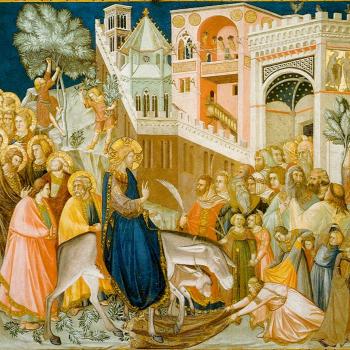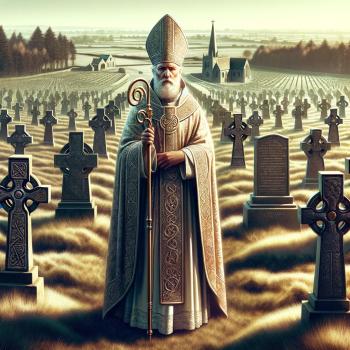"We tell ourselves stories in order to live," Joan Didion writes. "We look for the sermon in the suicide, for the social or moral lesson in the murder of five." Since the Saturday before last, Catholics have been busily telling themselves stories about Fr. John Anthony Corapi. Corapi, host of a popular weekly show on EWTN, was recently placed on administrative leave pending investigation into charges—which he strongly denies—of conduct unbecoming a priest.
For Corapi to have committed the alleged acts—which, he has revealed, include accusations of "sexual exploits" with multiple women and "drug addiction"—is unthinkable to many. For one thing, Fr. Corapi is an evangelist of singular gifts; when the news broke, one internet commenter after another credited him with either bringing them into, or keeping them in, the Church. But more importantly, Corapi famously renounced a profligate life in order to answer the call to holiness. That a man, once redeemed, could backslide, despite living the ecclesial life 24/7, is the kind of idea that can shake a person's faith.
Most of the responses share a basic common form. Fr. Corapi is the victim of slander, somehow encouraged by forces ranging from the political—"In this Socialist Democrat era anything goes," one poster thundered—to the supernatural. The best-thought-through of the least earthly narratives goes:
Perhaps Our Lady is so fed up with the implementation of the "Guilt by Accusation" policy that has neutralized & damaged so many of her sons who are innocent that she interceded with her Son to intervene.
Perhaps He wants one sacramentally configured to Himself, so well-known and beloved, being subjected to this in order to provoke among His faithful so great a hue & cry that this institutionalized policy of travesty is eliminated once and for all.
I have to confess, I like these stories. Believing so firmly in the complete innocence of a total stranger, even a compelling and gifted one, takes real nobility of spirit. It demands a willingness to trust, to risk the kind of disappointment that tosses a person into a state where, as Didion puts it, none of the scripts make sense.
I see this with special clarity because I lack those qualities. Stunting their growth is a residual attachment to irony. When I speak of irony, I'm not using the debased, hipster definition, meaning a belief in meaninglessness. No, I mean the stubborn sense that Fate gives us exactly the opposite of what we expect in order to teach us how foolish we are to expect it. Looking for a guru? Of course he'll turn out to be a bum—and he'll do it at the worst moment imaginable, in a way that will feel like a dart between the eyes. Drag yourself out of the muck, and you will, by virtue of your very gifts and talents, find some way back in.
Even as a small child, I had a basically ironic view of God. I saw Him as the grand monkey's paw, a Being who would trip you up not for failing to be good, but for failing to appreciate His subtlety. For example, when I was about 6 years old, I had a consuming fear of vampires. I decided that I could protect myself best by sleeping in a small space between my bed and the wall, where I would be harder to get at than meat from a picked-over crab shell. For good measure, I shut my door; since it scraped against the carpet, no vampire could possibly enter my room without waking me up.
Before shutting my eyes each night, I would pray: "Please, God, don't let any vampires get me." Then, smirking, I would add: "And don't let me get stuck here in case there's a fire." I could picture God gnashing his teeth, sputtering, "Curses! Foiled again!"
I'm not exactly sure when irony started looking shabby as a cosmic operating principle, but I think it has something to do with what happened to my father. When he married for the first time, his father-in-law bought him a house in a lovely rural stretch of the Delaware Water Gap. For as long as the marriage lasted, he passed his days among green lawns, ancient shade trees, forests thick with game—which, on one occasion, he actually hunted.
After the marriage dissolved, he spent the next twenty-five years in far less picturesque places and (aside from my mother, of course) among far less picturesque women. Finally, in 1991, while on his fifth marriage, he bought six acres in the Catskills, onto which he added a cottage, a bass pond, and a terraced flower garden. To all appearances, he'd achieved the impossible: he'd regained paradise, even if he could only enjoy it on weekends.
It was at that house—in the garden, in fact—where he was stung by a bee. The sting triggered an anaphylactic reaction that killed him five minutes before the EMTs arrived. Someone told me later he'd been one of only seven bee-sting fatalities recorded in the year 2002.





